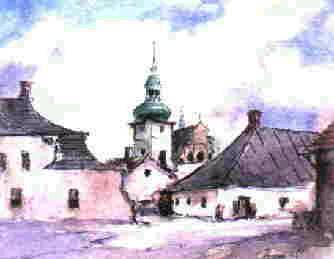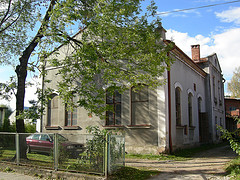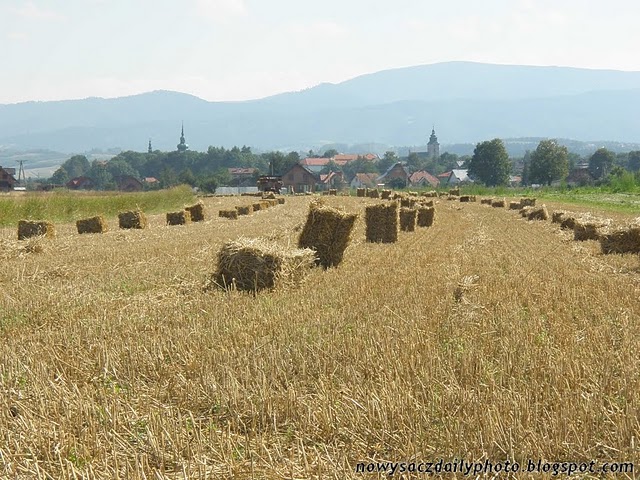


Stary
Sącz, Poland
Alternate names:
Stary Sacz [Polish], Alt-Sanz [Yiddish], Altsandez [German], Tzantz Yashan [Hebrew],
Stary Soncz

(Founded in 1280)
(Latitude 49°34´, Longitude 20°39´)
185.9
miles S of Warsaw
(Nowy Sącz, Poland~ Click Here!)


1905
1971
Stary Soncz, Cracow District, Poland - Jews are first mentioned in 1469, but only formed an organized community under Austrian rule with the end of residence
restrictions in 1860. The Jewish population stood at 666(total 5,156) in 1910. All Jewish stores were looted in 1898 and declining economic conditions and the
rigors of WWI led to emigration, the Jewish population standing at 553 in 1921. The Halberstam Hasidic dynasty of Zanz provided the community with rabbis.
Under the German occupation, a Judenrat was set up at the end of 1939 and a ghetto crowding together 1,000 Jews including refugees was established in
spring 1942. On 17 August, after the sick and old were murdered, all were expelled to Nowy Soncz for deportation to Belzec death camp.
Source: The Encyclopedia of Jewish Life Before and During the Holocaust by Shmuel Spector (editor)and Geoffrey Wigider (consulting editor), Yad Vashem,
Jerusalem [2001] 0-8147-9356-8
Nowy Sacz (Sonch)'s older sister town of Stary Sacz (Sonch) lies 6 miles (10 km) south, high above the Poprad, just before it joins the Dunajec
(Dunayets). Its cobbled Rynek is among the quaintest squares in the country: the houses, which are only one or two story high, mostly date
from the 18th century, and one of them contains a delightfully ramshackle local museum. To the south is the parish church, a Gothic building
with Baroque decoration. More significant is the fortified convent of the Poor Clares to the east, which was founded in 1280 by the Blessed Kinga,
widow of King Boleslaw the Chaste. The Baroque frescos in the nave depict scenes from the life of the foundress, whose statue can be seen in the
chapel devoted to her memory. Opposite the latter is the seventeenth-century pulpit, which incorporates a florid carving of the Tree of Jesse.
Source: http://www.lemko.org/lih/travel/beskid.html
In spring 1940 the Nazi authorities
established a ghetto in Stary Sacz. Jews from Stary Sacz were taken there
and also those displaced from nearby villages.
The ghetto was dissolved on August 17, 1942 and its inhabitants were
deported to Nowy Sacz, and from there they were subsequently taken to the camp
in Belzec.
During
the action of dissolving the ghetto the Nazis shot a group of elderly and sick
people in the Piaski district.
Source: Virtual Shtetl http://www.sztetl.org.pl/en/city/stary-sacz/

Synagogue –Originally Built in 1906
(Stanisława Staszica 10)
Stary Sącz - Related Links ~
- Touring Stary Sącz (Polish) includes history, local attractions & some nice photos
- Stary Sącz
(Town &
Municipality)
- Virtual Shtetl
commemorating the history
of Polish Jews & the towns where they lived – includes maps, history,
photos, etc.
- Stary Sącz (Miasto i Gmina) includes town Video
in Polish (top right)
- Photos – Stary Sącz - May - 2007
- Early Music Festival (Polish)
- “Stary Sacz Society”
- Surnames
- Montefiore Cemetery in Springfield Gardens, New York
- Today’s Weather
- Satellite View via Google Maps - Zoom in to See Map
Overlay

Stary Sacz – Summer, 2009
Other –Genealogy- Related Links ~
- Polish Jewish History
- Jewish Historical Institute – (Zydowski Instytut Historyczny) (Warsaw)
- Jewish Tombstone Symbols in Poland
- Yad Vashem – a searchable Database of Shoah Victims' Names/Pages of Testimony
- Yad Vashem – a searchable Online Photo Archives
- Polish Maps (historical)
- Routes to Roots Foundation, Inc. -
Searchable Database of Archive Documents in Poland, Ukraine,
Moldova, Belarus and Lithuania
- Cyndi’s List Jewish
- 32nd IAJGS International Conference on Jewish
Genealogy July 15-18, 2012 --- Paris, France
And don't neglect the wonderful treasures at JewishGen ~
- Find Others with Roots in Nowy Sącz -- thru the JewishGen Family Finder
- JRI – Poland -- a searchable database of over 4 million 19th century Jewish vital records from more than 500 Polish towns!
- Gesher Galicia / Galicia SIG– how to subscribe
- Manifest Markings – A Guide to Interpreting Manifest List Annotations by Marian Smith, Historian, INS
- Want Information on Other
Shtetls? -- go to ShtetLinks
- Bibliography: Polish-Jewish Genealogical Research – a list of some incredible resources
 Comments?/Questions? (send an e-mail)
Comments?/Questions? (send an e-mail)
|
Compiled by Deborah Raff Lovingly Updated 22 June 2013 Copyright © 2003 Deborah Raff |
Jewish Gen Home Page | ShtetLinks Directory
This site is hosted at no cost by JewishGen, Inc., the Home of Jewish Genealogy. If you have been aided in your research by this site and wish to further our mission of preserving our history for future generations, your JewishGen-erosity is greatly appreciated.
